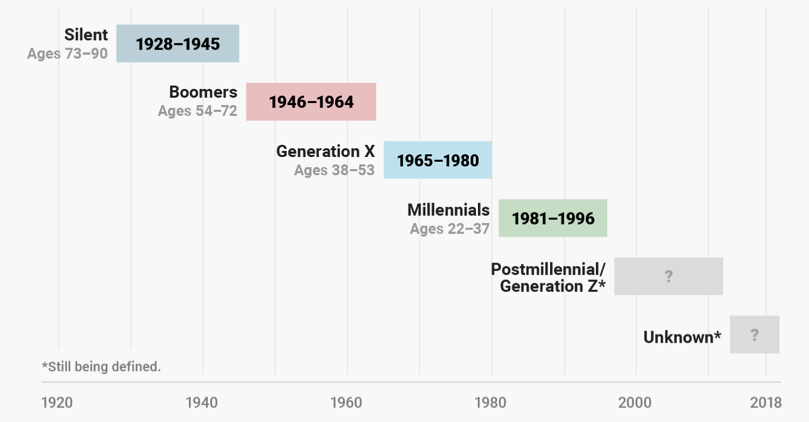Generation Games

We read headlines about Millennials and Generation Z (Gen Zs) daily, but many people are still not clear about the exact definitions of of these terms. Before shedding light on these groups, let’s take a brief glance at some generations prior to Millennials and Gen Zs, as well as an important related topic: why generational cohorts matter.
A Brief Glance at Previous Generations
Baby Boomers: People in this generational cohort were born after World War II. Per demographic studies, Boomers generally refused to follow traditional values and redefined them. Furthermore, they are considered to be the most active, fit, and wealthy generation as compared to the previous generations.
Generation X (Gen X): After Baby Boomers came Gen X. It was the time when there was a shift in societal values. Adult supervision, as compared to the previous generation, was reduced, and children born in this era were more self-dependent.
Why Do Generational Cohorts Matter?
In today’s world, generational cohorts matter, particularly in the advertising world. As a marketer or an advertiser, you simply cannot rely on a single message for a product or service to cater to an audience of every age group. This is the main issue that defining generational cohorts solves: segmenting audiences with similar values, ideas, lifestyles, and life experiences. This segmentation by generational cohort allows marketers and advertisers to create specialized messages for each age group.
Definition of Millennials and Gen Zs
Millennial: Generally categorized as those people who reached young adulthood by early 2020 and also referred to as Generation Y, it is commonly believed that Millenials cannot imagine life without gadgets, technology, and the internet. Social networking for them via digital means (i.e. using Facebook, Twitter, MySpace, etc.) is essential.
Gen Z: Gen Zs are post-Millennials. Born in a digitally revolutionized world, they are the most comfortable generation with technological advancements.

How AdInMo defines Gen Z and Millennial
There is not full agreement on the proper name for the post-Millennial generational cohort; however, Gen Z has become a common name for them. At AdInMo, we define Gen Z as people who are below the age of 19 (as of 2018), and Millenials as those from 19 to 35 years of age. Both of these generations are also known as “Digital Natives”, i.e. people who are born and brought up in the digital age. Hence, life without technology is unimaginable for them.
Why do Gen Zs and Millennials Matter?
Millennials and Gen Zs are important in today’s advertising and marketing frameworks. As they have different perception levels, satisfying them with traditional ads is a difficult feat, especially since nearly half of Millenials and Gen Zs don’t watch traditional TV. Unlike previous generations, they look for personal relevance in every ad they view and perceive it accordingly. This partially explains their low tolerance level to conventional ads. Since they form the major target audience for marketers in today’s world and the years to come, it is important to consider what these audiences want to view for effective marketing.
To learn how AdInMo can create authentic engagement experiences for your brands, email info@adinmo.com or visit us www.adinmo.com
More…
AdInMo and Kwalee take in-game ads to the next level
An innovative new integration with AdInMo powers Kwalee’s popular truck simulation game Tow N Go to drive monetization and support user acquisition across its portfolio of mobile games. We're excited to unveil a new integration with global mobile game publisher and...
Maximizing Reach and Revenue: HGC 2023
Our CEO and Co-founder, Kristan Rivers, will be speaking at HGC23 in Berlin next week. Hit Games Conference (HGC) is a popular B2B gaming event runing for two days and featuring talks and panel discussions with many of gaming's leading experts.Mobile Game Publishing:...
Optimizing for revenue not joy: Gamesforum London and the mobile gaming monetization predicament
Has the mobile games industry's relentless pursuit of revenue optimized the joy out of the player experience? I’ve just returned home from a two week business trip involving a lot of trains across Europe, with the last stop including London and the always-educational...



